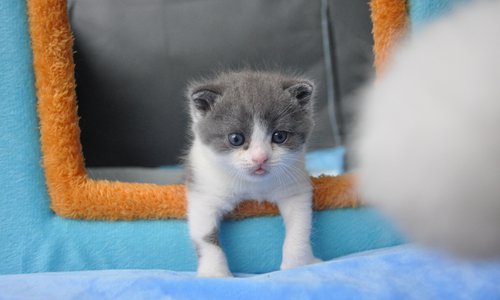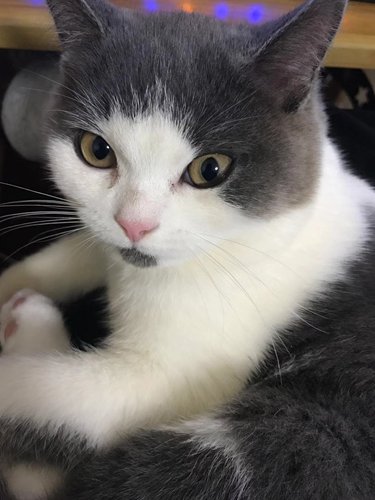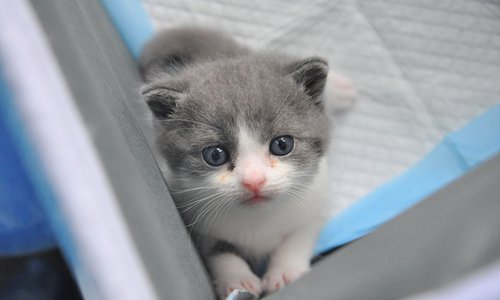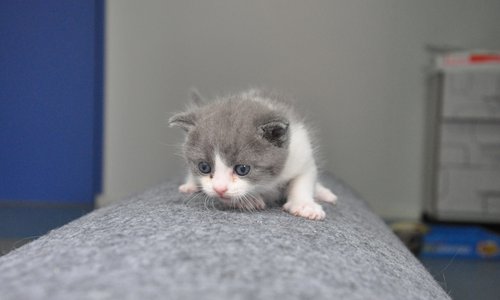HOME >> CHINA
Chinese gene firm clones cat, sparking wide consumer interest
By Liu Caiyu and Xu Keyue Source:Global Times Published: 2019/8/19 19:48:41

The cloned kitten "Garlic" was born on July 21 at the Sinogene Biotechnology Company in Beijing, believed to be the first successfully cloned cat in the country. Photo: Courtesy of Sinogene
Cat lovers who are devastated by the death of their beloved felines may soon be able to have their pets cloned, following the birth of China's first cloned kitten.
The cloned kitten, named "Garlic," was born on July 21 and cloned at the laboratories of Sinogene Biotechnology Company in Beijing.
The company started its experiment on cat cloning in August 2018, and Garlic, a British shorthair, was born 66 days after an embryo was transferred to a surrogate mother, the company said at a press conference on Monday in Beijing.
"My cat died of urinary tract disease. I decided to clone him because he was so special and unforgettable," the cat owner Huang Yu told the Global Times.
Garlic and the original cat, which supplied the cells, appear identical but have different temperaments and personalities, Lai Liangxue, the company's chief scientist and a research fellow at the Chinese Academy of Sciences, told the Global Times on Monday. A cloned cat's life expectancy is the same as any other cat, Lai said.

Pictured is the original cat that was used to clone "Garlic." Photo: Courtesy of Sinogene
To make the cloned animal share the same memories with the original, the company is considering the use of artificial intelligence or man-machine interface technology to store them or even pass the memories to cloned animals, the general manager of Sinogene said at the conference.
Sinogene deputy general manager Zhao Jianping said the successful cloning of Garlic will allow the company to officially start offering cat-cloning services, which is expected to cost 250,000 yuan ($35,400) each.
Zhao told the Global Times that several cat owners had already booked the service, hinting that the future market could be huge. The company also offers a dog cloning service, costing 380,000 yuan.
China has more than 73 million pet owners and more than two-thirds of them care for a dog or a cat, according to a 2018 report by CNBData.

The cloned kitten "Garlic" was born on July 21 at the Sinogene Biotechnology Company in Beijing, believed to be the first successfully cloned cat in the country. Photo: Courtesy of Sinogene
Cloning a cat or dog requires an embryo to be cultivated from the cell of the animal, before being implanted into the surrogate mother's uterus, Lai explained. The process - from cell extraction to birth - takes at least two months, Lai said.
The Beijing-based company is mulling using its cloning technology on endangered animals.
According to Lai, cloning an endangered animal would require experiments on interspecies cloning, but no scientist has so far successfully cloned a cross species animal due to technological barriers. It's still unlikely a rabbit can give birth to a pig, for example.

The cloned kitten "Garlic" was born on July 21 at the Sinogene Biotechnology Company in Beijing, believed to be the first successfully cloned cat in the country. Photo: Courtesy of Sinogene
Although the cloning technology is music to pet owners, it remains controversial among scholars. Many argue that the animals suffer from the technological process which also poses threat to their rights. Some worry the cloning technology would apply to human beings one day, which might cause ethical problems.
Chen Dayuan, a professor of the Institute of Zoology of the Chinese Academy of Sciences, noted at the conference that his team was trying to inject a body cell from the panda into an enucleated egg cell taken from a cat, as both babies are in similar size and the gestation period is both at two to three months.
China created the panda's early embryo on interspecies cloning in 1999 and has yet to bear a cloned panda through the interspecies clone, Chen said.
"Because of the limited number of endangered species, such as giant pandas, scientist can't directly conduct cloning experiments on them unless we can find a replacement," Lai explained.
Newspaper headline: Gene firm clones cat, sparking wide consumer interest
Posted in: SOCIETY